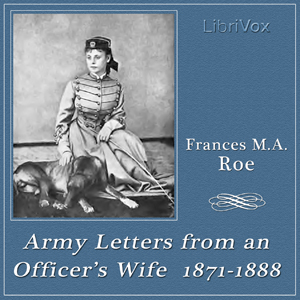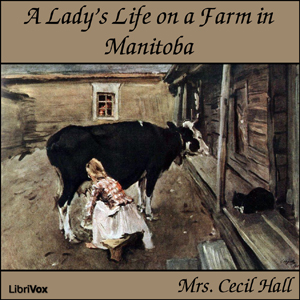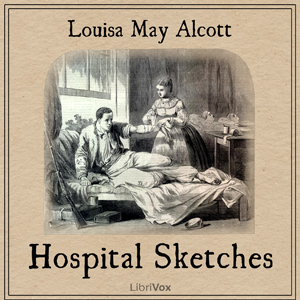In 1881, Mrs. Cecil Hall's brother went to Manitoba to farm. In 1882, she went out for a visit of some two months, and followed that visit with a long sojourn in Colorado, returning to England as the snows began to fall. While there, she had to give up her "Lady's ways" and help on the farm in many ways she'd never stoop to at home. She makes hay, cooks, paints the barn roof, and cleans. Through it all, the newness helped her keep her temper, and these letters home show an insight into the settlement of Western Canada. These letters have a feel of "Little House on the Prarie" from an English lady's point of view. (Summary by Sibella Denton).
38 episodes
Alcott in 1862 served as a nurse in Georgetown, D.C during the Civil War. She wrote home what she observed there. Those harrowing and sometimes humorous letters compiled make up Hospital Sketches. (Summary by Aaron Elliott)
6 episodes
Au printemps 1336, François Pétrarque entreprend avec son frère l'ascension du mont Ventoux, qui, de ses 1912 mètres, domine le Comtat Venaissin et la Provence. C'est cette ascension et son pendant mystique que François Pétrarque relate, le jour même, dans une lettre datée du 26 avril, à son ami et confesseur Dionigi di Borgo San Sepolcro, lettre qui fut ensuite publiée sous le titre L'ascension du mont Ventoux. Le texte original est en latin. Il a été traduit en français en 1880 par Victor Develay. (de Aldor)
1 episodes

"There appeared from the bushes in front of me, and right in the path, two immense gray wolves . . . Rollo saw them and stopped instantly, giving deep sighs, preparing to snort, I knew . . . To give myself courage, I talked to the horse, slowly turning him around . . . when out of the bushes in front of us, there came a third wolf! The situation was not pleasant and without stopping to think, I said ‘Rollo, we must run him down - now do your best’ and taking a firm hold of the bridle, and bracing myself in the saddle, I struck the horse with my whip and gave an awful scream. . .” Thus, the spunky and resourceful Frances Roe recounts one of her many adventures. Frances was the young wife of a West Point Army officer, whose career took them both to frontier garrisons in what are now the states of Kansas, Colorado, Oklahoma, Utah, Montana, and Wyoming. Her letters home to her family in upstate New York, written between 1871 and 1888, and published in book form in 1909, are a fascinating chronicle of life on the frontier. Despite the grittiness of keeping house in tent-and-log-cabin quarters, Frances took to Western life, learning to shoot and ride (side saddle), fly fish for trout and hunt buffalo. Her letters, chatty and detailed, open windows on varied aspects of frontier and army life: army protocol (including the right of senior officers to bump subordinates out of their housing ); the Indian tribes--Arapahoe, Cheyenne, Apache, Kiowa (ceremonial visits from chiefs as well as Indian warfare); the black cavalry troops (at Camp Supply in Indian Territory); Chinese cooks (also Polish, Irish, and enlisted men doing kitchen duty). Her letters span years of rapid change in the West. They touch on the disappearance of the buffalo herds, the decline of the Indian tribes and the coming of the railroads. Even Yellowstone Park, established in 1872, gets a mention: “Now that the park can be reached by railroad, all of the generals, congressmen, and judges are seized with a desire to inspect it--in other words, it gives them a fine excuse for an outing at Uncle Sam’s expense.”Her emotions run deep when she writes: “I love army life here in the West, and I love all the things that it brings to me--the grand mountains, the plains, and the fine hunting.” But, Frances’ husband, Fayette Washington Roe, is eventually promoted to a headquarters desk job. Frances tries to evinse enthusiasm for town life: “since I cannot return to the plains, I might as well go to the city, where we will meet people of culture.” But even shopping for the necessary clothes distresses her: “Parasols have bothered me. I would forget to open them in the street, and would invariably leave them in the stores when shopping and then have to go about looking them up.” She then utters a timeless cry of urban angst: “It is the feeling of loneliness I mind here--of being lost and no one to search for me.” (written at a hotel in Omaha, Nebraska in August 1888) Anyone with nostalgia for or curiosity about the Old American West will certainly enjoy this book. (Summary by Sue Anderson)
22 episodes
For this collection, LibriVox volunteers made their own selections from Robert Browning's poetry and prose to celebrate the 200th anniversary of his birth on 7th May 1812.
30 episodes
“Being the Familiar Correspondence of Vincent Van Gogh ... [Van Gogh's] art was appreciated during his life only by a very few and it is but within recent years that it has found admirers who in many cases have been most ardently enthusiastic. Of the following letters, some were addressed to his brother and the remainder to his friend E. Bernard. (Summary from Preface)
17 episodes

The strong, vigorous, exalted character of a doting father who loved playing with his children and their pets, even while serving as the President of the United States, stands revealed in this selection of letters he wrote his children throughout their school years. They shed light on the cheerful man who remained throughout his life as pure and gentle as the soul of a child, plus many little reveals that there were squirrels nesting in the presidential bedroom, rats in the basement, and children's pranks that damaged the White House artwork! Many of these letters are considered valuable guides for youth in all ranks of life, notably those on the relative merits of civil and military careers, and the proper proportions of sport and study. Only a short time before he died, Teddy Roosevelt said "I would rather have this book published than anything that has ever been written about me." ~ Summary by Michele FryNOTE: Roosevelt gave titles to all his letters, and all letters in this audio collection are recorded in sequential order with their titles. Most are too short to be published as separate audio files, thus several have been combined in most cases.
56 episodes
A series of letters on the early occupation of the colony, the Aborigines, etc addressed by Victorian pioneers to his Excellency Charles Joseph La Trobe Esq. , Lieutenant-Governor of the Colony of Victoria in response to a circular letter sent by him to a number of early settlers dated 29th July 1853. -
It cannot be claimed for these papers that they are infallible records of our early history at every point.
( from the preface),
The last section ends with lists of Aboriginal words and phrases as were collected by a lady. I'm in 2 minds about these, I respect her desire to keep a record but do not have any idea of their correctness, but they are there if anyone wants to have a go. And please remember that no one is saying the views in the letters are correct. (Annise)
59 episodes
Esta obra de trata de 09 cartas literarias escritas por el autor durante su estadía en el monasterio de Veruela en el invierno de 1864 y parte de la primavera. Se sabe que estas cartas fueron publicadas en el diario "El contemporáneo" de aquella época durante el año indicado. - Resumen por KendalRigans
9 episodes
The book is a selection of letters written by Tagore, in various places in Bengal, India.
37 episodes
Personal correspondence of Bohemian religious reformer John Huss (Jan Hus) from 1411 when he was exiled from Prague through his death by burning as heretic in 1415 by order of the Council of Constance. These were first published in 1536 by the German Protestant reformer Martin Luther and his introduction is included here. - Summary by Rom Maczka
14 episodes
This collection of Mark Twain travel letters was compiled by Barbara Schmidt for her website, TwainQuotes.com. According to his biographer, Albert Bigelow Paine, when Twain took his family to Europe in June of 1891, he left with the knowledge that the McClure Syndicate and W. M. Laffan of the New York Sun would pay him one thousand dollars each for six travel letters. Twain’s letters eventually appeared in numerous papers including the Chicago Sunday Tribune, Atlanta Constitution, Boston Globe in addition to the New York Sun. Readers of his “The Innocents Abroad” and “A Tramp Abroad” will remember his knack of viewing his discoveries with satirical and ironic twists. - Summary by John Greenman and Barbara Schmidt
6 episodes
A collection of letters written by Stuart Walcott while training to be an aviator in France to prepare for combat. Walcott died in his first aerial combat after first downing a German bi-plane. - Summary by KevinS
6 episodes












